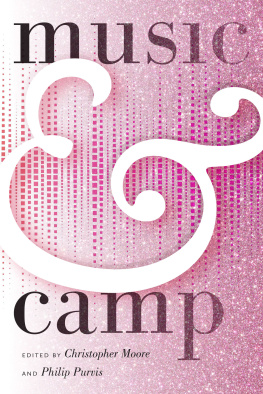PRAISE FOR GLITTER UP THE DARK
Fortunately, there are progressive art objects. There are transgressive art objects. But every now and then, we get revolutionary art objects that change how we talk, read, and think. Sasha Geffens Glitter Up the Dark changed the way I hear music and the convenient way I understand gender and performance in and outside of music. One will not hear or reproduce traditional understandings of gender ever again after experiencing this boldly brilliant book.
KIESE LAYMON, author of Heavy
Sasha Geffen follows the glamour and the glitter across a musical universe of queer and trans performances. Not looking simply at particular stars nor following a musical movement like punk from its roots to its demise, Glitter Up the Dark travels the multiple lanes of a trans-musical express. With riffs on the trans voice; careful attention to histories of performance, reception, and fashion; and theories of queer time and space, this book sparkles and glows. Read it, listen to it, love it.
JACK HALBERSTAM, author of Gaga Feminism
With simply brilliant writing and joyfully queer insights, Sasha Geffen dives deep into rocks gendersmashing history, reminding us of the ecstatic potential when art and transgression collide.
MICHELLE TEA, author of Against Memoir and creator of the Drag Queen Story Hour
How does music make gender audible in all of its rich, expressive, shifting forms, far beyond binary definitions? How have artists as ubiquitous as the Beatles and as cult-yet-crucial as Poly Styrene and Wendy Carlos helped us hear and understand the truths of bodies who, as the author writes, demand to choose their own shapes? This scintillating and deeply considered account of pops queer and trans history answers these questions with inspiring stories of rebellion and community, bratty punks and androgynous poets, studio inventors and prophets of the dance floor. An absolutely necessary account of what has always been at the heart of popular music: transformation.
ANN POWERS, author of Good Booty
AMERICAN MUSIC SERIES
Jessica Hopper and Charles Hughes, Editors Peter Blackstock and David Menconi, Founding Editors
ALSO IN THE SERIES
Hanif Abdurraqib, Go Ahead in the Rain: Notes to A Tribe Called Quest
Chris Stamey, A Spy in the House of Loud: New York Songs and Stories
Holly Gleason, Woman Walk the Line: How the Women in Country Music Changed Our Lives
Adam Sobsey, Chrissie Hynde: A Musical Biography
Lloyd Sachs, T Bone Burnett: A Life in Pursuit
Danny Alexander, Real Love, No Drama: The Music of Mary J. Blige
Alina Simone, Madonnaland and Other Detours into Fame and Fandom
Kristin Hersh, Dont Suck, Dont Die: Giving Up Vic Chesnutt
Chris Morris, Los Lobos: Dream in Blue
Eddie Huffman, John Prine: In Spite of Himself
John T. Davis, The Flatlanders: Now Its Now Again
David Cantwell, Merle Haggard: The Running Kind
David Menconi, Ryan Adams: Losering, a Story of Whiskeytown
Don McLeese, Dwight Yoakam: A Thousand Miles from Nowhere
GLITTER UP THE DARK
HOW POP MUSIC BROKE THE BINARY
SASHA GEFFEN

UNIVERSITY OF TEXAS PRESS
AUSTIN
Copyright 2020 by Sasha Geffen
All rights reserved
First edition, 2020
Requests for permission to reproduce material from this work should be sent to:
Permissions
University of Texas Press
P.O. Box 7819
Austin, TX 78713-7819
utpress.utexas.edu/rp-form
Library of Congress Cataloging-in-Publication Data
Names: Geffen, Sasha, author.
Title: Glitter up the dark : how pop music broke the binary / Sasha Geffen.
Other titles: American music series (Austin, Tex.)
Description: First edition. | Austin : University of Texas Press, 2020. | Series: American music series | Includes index.
Identifiers: LCCN 2019039555
ISBN 978-1-4773-1878-2 (paperback)
ISBN 978-1-4773-2083-9 (ebook)
ISBN 978-1-4773-2084-6 (ebook other)
Subjects: LCSH: Gender identity in music. | Sex roles in music. | Popular musicHistory and criticism.
Classification: LCC ML3470 .G44 2020 | DDC 781.64086/7dc23
LC record available at https://lccn.loc.gov/2019039555
doi:10.7560/318782
For my siblings
CONTENTS
INTRODUCTION
An Alternate Ribbon of Time
The gender binary cannot really be broken because the gender binary has never been whole. It has always limped along in pieces, easily cracked by a brief foray into the historical record. The Christian colonialist construction of men as inseminating subjects and women as reproductive objects does not extend into ancient history, nor does it govern every facet of the present. Masculinity and femininity, so much as they refer to certain strategies for moving through the world, have never neatly corresponded to the two types of bodies defined in the opening passages of the Bible. Even human bodies dont hold true to the popular myth of strictly dimorphic sex, as anyone in the intersex community can tell you.
So the subtitle of this book is misleading, or rather it only holds true when viewed through a limited lens. There have always been more than two genders, and music and gender nonconformity have gone hand in hand since long before pop music emerged as a productsince before the concept of product existed. But the patriarchal order, in order to survive, needs to brand threatening ideas as artificial, superimposed, harmful, and new, so as to distract from the underlying truth: that patriarchy itself is artificial, superimposed, harmful, and not nearly as ancient or universal as it pretends to be. Hardly the natural order of the human being, patriarchy relies on the illusion of its own inevitability to survive.
The notion that only two genders exist, and that each gender prescribes specific behaviors, movements, and relations, has always been undercut by a thriving spectrum of deviant expressions
The gender binary, which seeks to clearly label who can get pregnant and who cant, who should have power and who shouldnt, has served white supremacy for as long as white supremacy has existed. But cross-dressing, homosexuality, and fluidity of form sparkle throughout history. Its just that the powers that be still need the binary to persist to keep cis white men in charge and cast aside everyone else, and so they rigorously shutter the light that leaks in from just outside their cage.
Music shelters gender rebellion from those who seek to abolish it. In music, drag is not an aberration but a form of play. Women can sing with masculine bravado and men can adopt transcendent femininity: poses that were often dangerous to display offstage and outside the recording studio for people of all genders. Drag queens such as Julian Eltinge sang in vaudeville revues to broad acclaim while homosexuality was still illegal in the United States during the first decades of the twentieth century. Queer, trans, and gender nonconforming artists similarly populate the history of blues, R&B, jazz, and rock and roll. Theres no pop music without artists who reveled in lashing out against the gendered expectations levied upon them from on high.
The blues as a cultural product begins with Gertrude Ma Rainey, the southern singer who in 1923 signed a record deal with Paramount and soon became famous throughout the United States for her powerful, androgynous voice. Her friend and collaborator Bessie Smith, who had auditioned for Raineys band in 1911, similarly became a star after signing to Columbia Records. Both women were black and queer, and both sang about lesbian love via barely coded lyrics. Raineys song Sissy Blues also playfully celebrated feminine gay men: My mans got a sissy / His name is Miss Kate / He shook that thing like jelly on a plate, she sings. In prewar America, major record labels were willing to sell gay records so long as they came from black women, whose voices and presences already deviated from mainstream norms.
Next page








